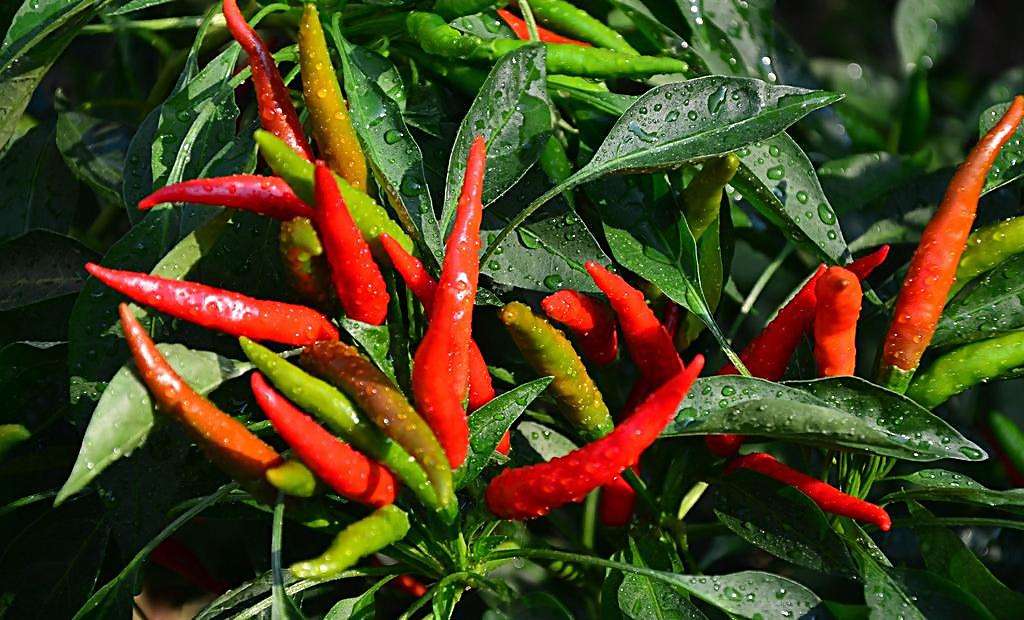(单词翻译:单击)
It's standard for spicy food to cause your upper lip to sweat, your nose to run, and your mouth to feel like it's on fire. But can eating hot peppers mess with your health post-meal? The question is worth considering, especially as the ALS Pepper Challenge gains popularity.
一般来说,辛辣食物会让你的上嘴唇出汗、流鼻涕、嘴巴好似着火一般。但吃辣椒会不会打乱你的餐后健康呢?这一问题值得考虑,尤其是在ALS辣椒挑战越来越受欢迎的情况下,更是如此。
Stars like Kelly Clarkson and Shaquille O'Neal have been spotted swallowing spicy stuff for the challenge, which aims to raise awareness and funds for the neurodegenerative disease. But while we watched them struggle to chomp on crazy hot peppers, we couldn't help but wonder: What makes chilies so darn fiery and are they even safe to nosh on in excess? Here, we pepper nutritionist Wendy Bazilian, DrPH, with all our burning questions.
人们已发现凯莉·克拉克森和沙奎尔·奥尼尔等明星吞下辣椒、接受了这一挑战,这一挑战旨在提高人们对神经退行性疾病的认知、并为其筹资。但看着他们痛苦地吃下超辣的辣椒时,我们不禁思考:辣椒为什么这么辣,吃的过多是否安全?在此,辣椒营养师温迪·巴齐莲博士解答了我们所有有关辣椒的问题。

What makes peppers so hot?
为什么辣椒如此之辣?
The main compound that gives chilies their signature kick is a phytonutrient called capsaicin. "Capsaicin attaches to the receptors on the taste buds that detect temperature and sends signals of spicy heat to the brain," explains Bazilian, who's also the author of Eat Clean, Stay Lean.
令辣椒如此之辣的主要化合物是被称作辣椒素的植物营养素。"辣椒素附着于受体的味蕾,能够检测温度、向大脑发送辛辣信号,"巴齐莲解释道,她也是Eat Clean, Stay Lean的作者。
The amount of heat a pepper packs has to do with the level of capsaicin it contains. To figure out how spicy a certain type of hot pepper is, adventurous eaters can refer to the Scoville scale, which ranks varieties from most to least spicy based on their capsaicin concentration. The scale ranges from standard bell peppers that have no capsaicin to ghost peppers and the Trinidad scorpion-the spiciest chilies around.
辣椒的热量也与它的辣椒素含量相关。为了弄清楚某类型辣椒的辛辣程度,爱冒险的食者可以参考史高维尔指标,它基于辣椒的辣椒素浓度,将辣椒从最辣到最不辣进行了排列。该指标包含不含辣椒素的标准甜椒、印度鬼椒和特立尼达蝎子椒--最辣的辣椒。
Dangers of eating hot peppers
吃辣椒的危险
"It's a bit of a myth that hot peppers can actually create physical damage to the esophagus or tongue," says Bazilian. But that doesn't mean there are no dangers associated with noshing on fiery foods. Why? When we eat very hot peppers, the brain receives "pain" signals that can result in an upset stomach, nausea, or vomiting, says Bazilian. The stomach reacts as if you've consumed a toxic substance.
"辣椒实际上会对食道或舌头造成伤害是个谜,"巴齐莲说道。但这并不意味着吃辛辣食物不会有任何危险。为什么?当我们吃超辣的辣椒时,大脑会接收"痛苦"信号,导致肠胃不适、恶心或呕吐,巴齐莲说道。胃的反应就好像你摄入了有毒物质一般。
"If vomiting occurs, the acid that comes up from the stomach can irritate the esophagus," explains Bazilian. Depending how hot a pepper is, that irritation can cause serious damage. Back in October 2016, one man actually burned a hole in his esophagus after consuming ghost peppers during an eating contest.
"如果吐了,那胃中的酸会刺激食道,"巴齐莲解释道。基于辣椒的辛辣程度,这种刺激会造成严重的损害。2016年10月份,一名男子在一次大胃王比赛中吃了印度鬼椒后,食道上烧了一个洞。
译文属可可原创,仅供学习交流使用,未经许可请勿转载


